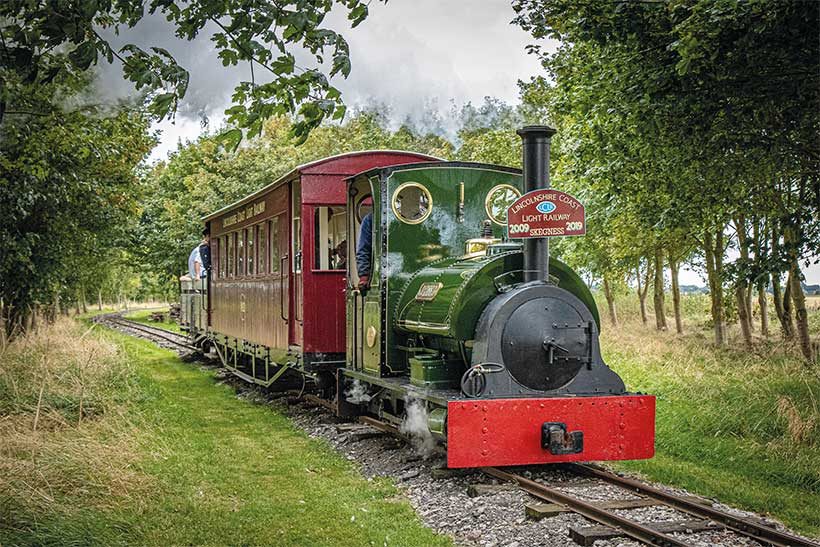The world’s first ever heritage steam train line, built and operated by enthusiasts – and also set within the grounds of a Lincolnshire holiday park – is set to reopen in 2021
The sound of a steam engine, with its distinctive whistle and the nostalgic smell of coal smoke and hot oil, should again be part of Skegness Water Leisure Park, in Ingnoldmells, near Skegness, once more in 2021. Covid regulations permitting, The Lincolnshire Coast Light Railway (LCLR) hopes to reopen on the holiday park and offer rides on its historic trains once more.
Visitors will get to see the railway’s new station building once a timetable has been agreed. Trains are expected to run on most July and August Saturdays and Wednesdays during the school holidays – as well as August Bank Holiday Sunday and for the Skegness Classic Wheels Show in September, of which it’s a major part.
This railway was the very first heritage line in the whole world to be built and operated by enthusiasts (as distinct from taking over an existing railway) when it opened on its original site at Humberston, some 40 miles to the north in 1960.
When that closed in 1985, everything went into storage and was then moved to the Water Leisure Park ten years later– reopening in 2009.
It had been planned to celebrate with special trains and a 1960s themed event in 2020, but like so much else, everything had to be postponed because of the pandemic and the trains stayed in their shed.
The dedicated volunteers who run the line spent their time on restoring their priceless collection of trains – many of which date back to the trench railways of the World War One battlefields. They even constructed a new station building. Signalling, historic diesel locomotives and carriages have been upgraded and the tracks and signals kept in perfect order.
Of course, the star of the show is the beautiful steam engine Jurassic: she dates from 1903, when she was built in Bristol for a cement works in Warwickshire, to pull train loads of stone from their quarry. It takes up to four hours to raise steam in her and another hour’s work after she has finished running, to drop the fire, clean out the boiler tubes, lubricate everything, top up with water and coal for her next working day – and to let her cool sufficiently to be safely stored in her shed.
All eight historic diesel locos have now been restored to working order – in one case, completing a task that has taken 30 years. They are based on designs built for the military in the First World War by a firm in Bedford called Motor Rail – and are known as ‘Simplexes’. The oldest, Nocton, first ran in 1920 on the Nocton Estates Railway in the Lincolnshire Fens, pulling train-loads of potatoes for Smiths Crisps and sugar beet. Others were built for quarries and brickworks; one – known as the ‘Skeg Simplex’ because it worked just down the road at Skegness Brickworks – survived being sunk under the sea in Mablethorpe (where it was being used by contractors on sea defence work) during the catastrophic East Coast floods of 1953.
So, there is much to explore and enjoy on the railway when you’re staying in the park. Even if the trains aren’t running, there are often volunteers around, helping to maintain and look after everything – and if you want to get involved, you can join their Historic Vehicles Trust (a registered charity) and be part of it. Full training is given to anyone wanting to be a train driver, fireman, guard or to work on the tracks and restoration.
Miriam Ellis and Ian Clarke, park managers, said: ‘We would firstly like to thank all of our customers for their loyal support and understanding through what continues to be challenging times for everyone. Let us hope that by adhering to the government’s guidelines we will be able to get back to some form of normality in 2021.
‘We are hopeful that we will be able to be to organise several events next year, so keep your eyes locked on to our social media pages for updates. On behalf of all of the staff, we would like to take this opportunity to thank you all for your custom.’



